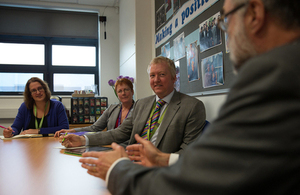New government drive to improve standards of school governance
Governors will need skills and experience to drive school improvement.

Meeting
School governors will in future only be appointed if they have the skills and experience to drive school improvement, under plans announced by the government today.
As part of the Department for Education’s commitment to a more professional standard of school governance, governing bodies will be expected to act more like corporate boards, and only appoint people with the skills to help their schools succeed.
Schools Minister Lord Nash said:
The best businesses have a skilful board of directors keeping them on the right path. I want to see the same approach in schools.
Our proposals will ensure governing bodies in local-authority-run schools have the people they need to drive up standards.
Currently, there is no requirement on governing bodies of local-authority-run schools to prioritise the skills of a prospective governor. Academies and free schools are already free to appoint the best people for the role.
New guidance also published today makes clear the vital role of governing bodies as non-executive strategic leaders, and sets out their core functions clearly for the first time.
Lord Nash added:
School governors have an incredibly important role in setting high standards, holding headteachers to account and ensuring money is well spent. I want all governors to live up to these expectations.
Stronger governing bodies will drive aspiration in schools and help young people get on in life.
The government is working with organisations like the Confederation of British Industry, National Governors’ Association, the Education and Employers Taskforce and the school governor recruitment charity SGOSS to attract more high-calibre governors and encourage more employers to support their staff to volunteer.
Emma Knights, Chief Executive of the National Governors’ Association, said:
The National Governors’ Association wholeheartedly supports the government’s proposals to focus governing bodies on their strategic functions. Being a school governor is an important responsibility akin to being a non-executive director of a trust or company; indeed many of those governing in academies are now directors and trustees.
Organisations with good governance do not fail, and we need to ensure that schools have the best governance possible. This starts with the recruitment of a good group of diverse people with the time, the necessary range of skills and experience and the commitment to improving the education of children and young people. The NGA looks forward to responding to the consultation.
Chris James, Professor of Educational Leadership and Management at the University of Bath, said:
This new advice and the proposals for regulatory reform are very welcome. All governing bodies will find them useful. They help to clarify the role and the responsibility and give guidance on how to improve governing body capability. Likening governing bodies’ role to that of a board of charity trustees or company directors is very helpful. This is a big step in the right direction for school governing.
Notes to editors
- See the consultation on proposed changes to the School Governance (Constitution) (England) Regulations 2012 and accompanying statutory guidance.
- See the new departmental advice on the School Governance (Roles, Procedures and Allowances) (England) Regulations 2013.
- The Department provides funding to www.sgoss.org.uk, the governor recruitment charity, to work with employers to recruit highly skilled new governors and broker their placement in schools and academies that need their particular skills. SGOSS recruited over 3,200 governors in 2012 to 2013.
- The CBI published a report on school governance and leadership on 27 November 2013 promoting the benefits to schools, staff and business of firms supporting their employees to volunteer as governors.
DfE media enquiries
Central newsdesk - for journalists 020 7783 8300